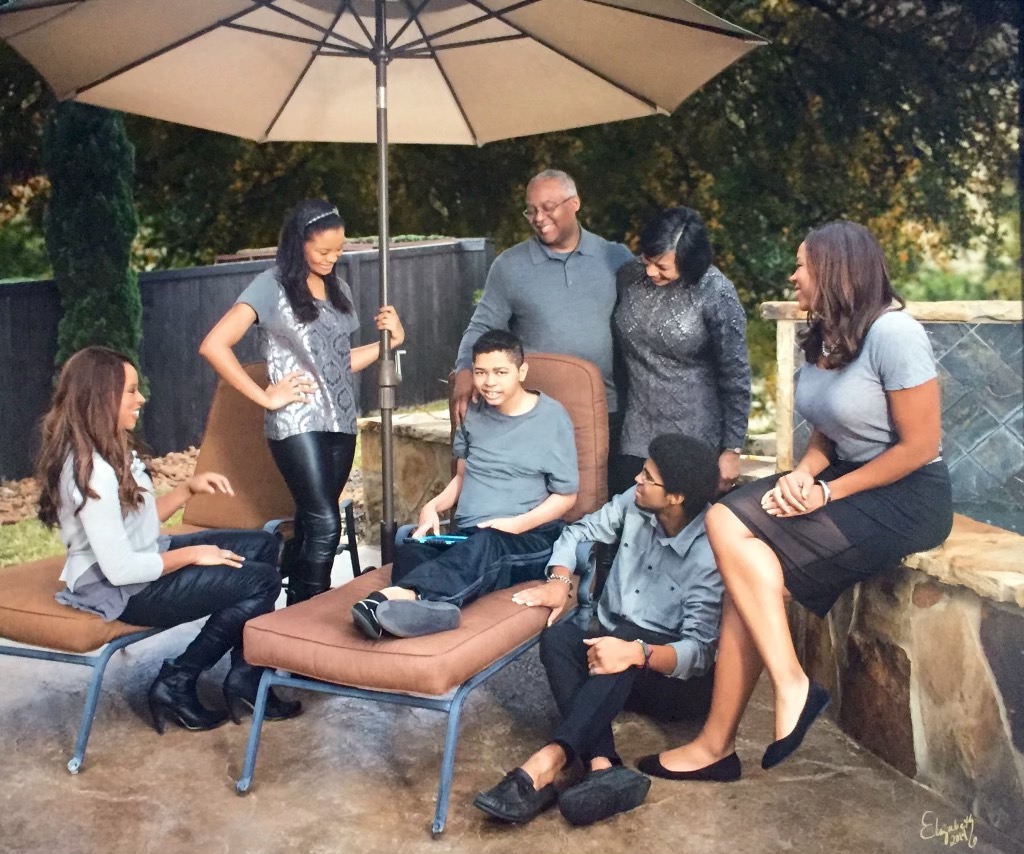
We are proud to share this guest post by Juli Henderson, creator of In Our Arms, a blog telling the story of late son Robert, and In Our Arms Community, an online community supporting families of children with disabilities.
I am not an expert on choosing the best school for your child. I am not an educator who can advise you on the services that make the most sense for your child. I only wish to share my journey with you after raising five children who were all in “specials.” Four of them were in the Gifted and Talented (GT) programs in multiple schools, and one of our children spent his entire educational experience in special education due to his very rare CHD2 disease and mitochondrial disorder. This disease and disorder involved a variety of body systems including the metabolic organs and muscles (poor stamina, muscle weakness, lack of muscle tone, heat intolerance, excessive sweating). These conditions also affected his brain and nervous system, causing all types of seizures and eventual diagnoses of cerebral palsy, autism, and intellectual disabilities.
Recognizing Our Children’s Needs
No one could have prepared me or given me the proper tools to navigate each one of our children’s needs. However, I had excellent educators, family members and girlfriends who helped me along the way.
Let’s first discuss recognizing that my children were “gifted” when they were in elementary school. I’m amazed that I even knew to have them evaluated. Actually, when our second daughter was tested for GT very early, it became obvious that our oldest daughter also needed to be tested. So, when our first son and then our third daughter came along, I knew more about raising gifted children, but I honestly leaned heavily on their teachers to guide me. I was just not smart enough to realize just how gifted they were. I’m not ashamed to admit that. It’s just the truth of how I parented them. I was always totally supportive of their learning at high levels, but sometimes felt very inadequate to instruct them, as their little brains absorbed concepts in such unique ways.
When our four oldest children attempted anything, they usually succeeded. I just expected them to succeed! Whether they enjoyed math, science or English classes, sports, dance, or music, they generally performed well, and things came fairly easily to them. They each had their strengths, and they seemed to thrive in finding their gifts.

Robert’s Educational Journey
But when our fifth child, Robert, came along and school discussions began, I was lost. I had no idea what I was doing. Robert was the twin brother to our third and youngest daughter, and he needed to begin school in a pre-K program designed for children who needed a head start because they were a little behind. We didn’t know Robert’s diagnosis at that time, and the idea of sending him into a classroom so young and without his twin sister was devastating to me. I listened to all of the information from his doctors and educators, and we decided to place him early in that program. It was hard.
I didn’t know what steps were needed for Robert, but I knew I would now need to use my voice to help direct, protect and monitor his educational journey more than our other children. I often felt overwhelmed when I visited the new rooms for Robert’s Admission, Review and Dismissal (ARD) meetings to help develop his Individualized Education Program (IEP) documents because they were foreign to me. I rarely needed to discuss our other children’s academic needs with their teachers and administrators. Not that they were perfect, but they were not medically fragile like Robert, so I could release them into the hands of their very trusted teachers and set them on GT autopilot. Robert, on the other hand, would never be on autopilot.
The ARD Meeting and the IEP
What is an ARD meeting’s purpose? Where should it lead all who are involved? An ARD meeting’s purpose is to combine a student’s teachers’ and school staff’s educational expertise with the parents’ knowledge and expertise of their child for the purpose of writing the child’s IEP. A parent’s role is vital to this process, as they have the crucial information on their child’s desires, needs, and abilities. Parents should be encouraged to share their expectations and hopes.
The first ARD meeting is to determine when and if the child first needs admission (“A” in ARD) into a specialized program and what that will look like via an IEP. Subsequent meetings are for reviewing (“R” in ARD) and revamping the IEP until a final meeting determines that the child can be dismissed (“D” in ARD) from the special intervention.
What I can offer you as a mom who has raised four successful adult children and one who passed away at the tender age of eighteen with profound medical needs is the encouragement to trust your gut instincts and use your voice to advocate for your child, no matter the level of “giftedness.” When you are headed into the world of “specials,” learn to ask questions that require answers about what your child’s day will entail; where the staff sees your child succeeding or being challenged; and ways you as the parent can support at home what is happening in the classroom.
Using My Voice
It was not comfortable when I disagreed with someone who was seated at the ARD meeting. It was not always easy to invite a family member or girlfriend to join me in those meetings because I needed to have an advocate on my side. It was not convenient to ask doctors to write letters explaining Robert’s medical history to give validation to my concerns. None of the decisions I needed to make for Robert’s school choices, or on-campus versus homebound education, were made lightly. I had tremendous support from his teachers and administrators, but I still needed to learn some things and dare to use my voice.
I Knew My Child Best
I needed to come to the understanding that I was the one who knew my child the best in the room. It was my job to speak up and ask questions and offer suggestions about what could work for Robert. I offered suggestions regarding when he could ride the bus to school and when he would need to stay home because his medical needs outweighed everything else.
I Needed Someone to Sit With Me
I learned that asking someone to sit with me in Robert’s ARD meeting was appropriate and healthy if I needed to have an extra ear and advocate. I was intimidated sometimes because, though I had a college degree, it was not in special education, so I felt inadequate. I learned that my voice about who Robert was at home was very important to all discussions about who he was at school. I was the best one at the table to offer that vital information.
Speaking With Emotions and Tears
I realize now that most school officials would prefer if parents would be prepared to discuss data without the emotions and tears. However, the very few occasions when I didn’t cry straight through the ARD meetings, I realized that I needed to use my voice to advocate for Robert’s need to have more homebound services. There were deep discussions because, although in those particular meetings everyone had Robert’s best interests in mind, they just did not align with the needs that I and his doctors saw as most important. My voice was needed, and I spoke up to make sure Robert’s best opportunities to be in the “least restrictive environment” for his special education were heard.
Ensuring the Success of the IEP Goals
I learned that one of my responsibilities as Robert’s mom was to help ensure the success of the IEP goals. That particular job was not always an easy job because Robert’s medical condition changed often during a calendar year. However, I did my best to keep good records and notes from year to year in a very detailed binder that included letters from his physicians.
I learned to say what I needed to say, and I spoke my truth. Mind you, I was most often seated with individuals whom I greatly respected and with whom I enjoyed close relationships. But I still needed to use my voice to advocate for Robert’s needs because he was unable to speak for himself. I rarely brought him in his wheelchair to the ARD meetings. I did include Robert several times so that those in the room could understand his profound medical diagnosis.
Be Prepared to Close the ARD Meeting
Lastly, I learned that Robert needed me to fully participate on his behalf. I was prepared at any point to close the ARD meeting as was my right as an ARD committee member. I never needed to do that or to bring an attorney to assist me in the advocacy, but I have friends who needed to do those things in order to advocate for their child’s needs and rights. I hope you will not need to take those actions on your journey. Just know that it is well within your rights to close the meeting and reschedule if you are not satisfied with the direction it is taking.

You Are the Parent
You are the perfect parent for your child. You know your child better than anyone else. Please use your voice to stand in the gap for them. You will most likely not take a journey similar to the one we took with our Robert. I wish you many more years than eighteen with your child. I would not trade one minute that I advocated for him, and I loved the incredible educational planning experience with all those who taught him.
You can do it. Use Your Voice!

Charter Moms Chats
Watch Juli Henderson, creator of the In Our Arms blog, speak with Inga Cotton on Charter Moms Chats on March 1, 2023 at 2:00 PM Central live on Facebook and YouTube.

Juli Henderson is a highly trained vocalist, vocal teacher, physician’s wife, mother of five adult children, and newly minted grandmother. She grew up moving frequently as a military child, but has called San Antonio, Texas, home for 38 years. The In Our Arms blog is her passion project, launching in February 2021 to share the story of Juli’s late son, Robert. As the mother of a child with disabilities who passed away at the tender age of eighteen, Juli’s writings give hope to thousands of readers, including a private Facebook group where members share resources and support.
Read More About Students with Functional Needs
- “Mother of a disabled child honors his life through advocacy,” Michelle Heaton, Qualified—Lessons in Loss, February 17, 2023
- “Understanding Learning Models for School Choice,” San Antonio Charter Moms, January 13, 2023
- “Raising Medically Fragile Kids,” Elaine Taylor-Klaus and Diane Dempster, Parenting with Impact, January 19, 2022
- “Where I Live: Stone Oak,” Juli Henderson, San Antonio Report, January 8, 2022
- “Decoding the IEP: Parents Learn from a Special Education Advocate,” Bekah McNeel, San Antonio Charter Moms, April 22, 2020